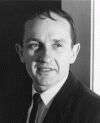Richard Montague
| Richard Montague | |
|---|---|
|
Richard Montague, at UCLA, c. 1967. | |
| Born |
September 20, 1930 Stockton, California |
| Died |
March 7, 1971 (aged 40) Los Angeles |
| Nationality | American |
| Fields | Mathematics, philosophy |
| Institutions | University of California, Los Angeles |
| Alma mater | University of California, Berkeley |
| Doctoral advisor | Alfred Tarski |
| Doctoral students |
Nino Cocchiarella Rudolf Grewe Hans Kamp |
Richard Merritt Montague (September 20, 1930 – March 7, 1971) was an American mathematician and philosopher.
Career
At the University of California, Berkeley, Montague earned a B.A. in Philosophy in 1950, an M.A. in Mathematics in 1953, and a Ph.D. in Philosophy 1957, the latter under the direction of the mathematician and logician Alfred Tarski. Montague, one of Tarski's most accomplished American students, spent his entire career teaching in the UCLA Department of Philosophy, where he supervised the dissertations of Nino Cocchiarella and Hans Kamp.
Montague wrote on the foundations of logic and set theory, as would befit a student of Tarski. His Ph.D. dissertation, titled Contributions to the Axiomatic Foundations of Set Theory,[1] contained the first proof that all possible axiomatizations of the standard axiomatic set theory ZFC must contain infinitely many axioms. In other words, ZFC cannot be finitely axiomatized.
He pioneered a logical approach to natural language semantics which became known as Montague grammar. This approach to language has been especially influential among certain computational linguists—perhaps more so than among more traditional philosophers of language. In particular, Montague's influence lives on in grammar approaches like categorial grammar (such as Unification Categorial Grammar, Left-Associate Grammar, or Combinatory Categorial Grammar), which attempt a derivation of syntactic and semantic representation in tandem and the semantics of quantifiers, scope and discourse (Hans Kamp, a student of Montague, co-developed Discourse Representation Theory).
Montague was an accomplished organist and a successful real estate investor. He died violently in his own home; the crime is unsolved to this day. Anita Feferman and Solomon Feferman argue that he usually went to bars "cruising" and bringing people home with him.[2] On the day that he was murdered, he brought home several people "for some kind of soirée", but they instead robbed his house and strangled him.[2]
See also
Notes
- ↑ Montague, Richard Merritt (June 1957). Contributions to the axiomatic foundations of set theory (Ph.D.). University of California, Berkeley.
- 1 2 Feferman and Feferman 2004: 332-3
References
- Feferman, Anita, and Solomon Feferman, 2004. Alfred Tarski: A Life. Cambridge Univ. Press.
- Donald Kalish, and Montague, Richard, 1964. Logic: Techniques of Formal Reasoning. Harcourt, Brace, and Jovanovich.
- Donald Kalish, and Montague, Richard, and Mar, Gary, 1980. Logic: Techniques of Formal Reasoning (second edition). Oxford University Press.
- Montague, Richard, 1974. Formal philosophy : selected papers of Richard Montague / ed. and with an introd. by Richmond H. Thomason. New Haven: Yale Univ. Press. (1979 printing: ISBN 0-300-01527-5)
- Partee, Barbara H., 2006, "Richard Montague (1930 - 1971)" in Brown, Keith, ed., Encyclopedia of Language and Linguistics, Vol. 8, 2nd ed. Oxford: Elsevier: 255-57. Includes a bibliography of the secondary literature on Montague and his eponymous grammar.
External links
- Richard Montague at the Mathematics Genealogy Project
- That’s Just Semantics! (or, the Proper Treatment of Richard Montague in Literary Fiction)
|
